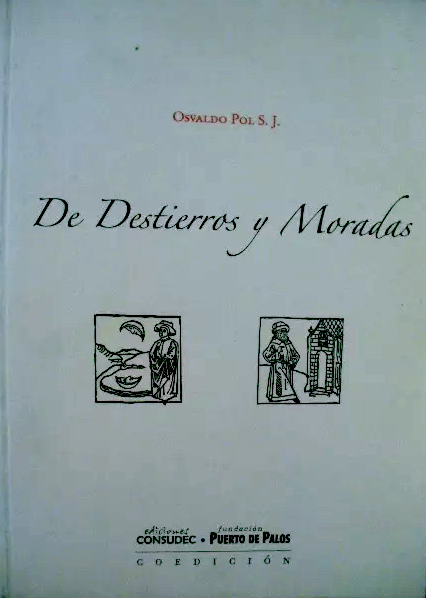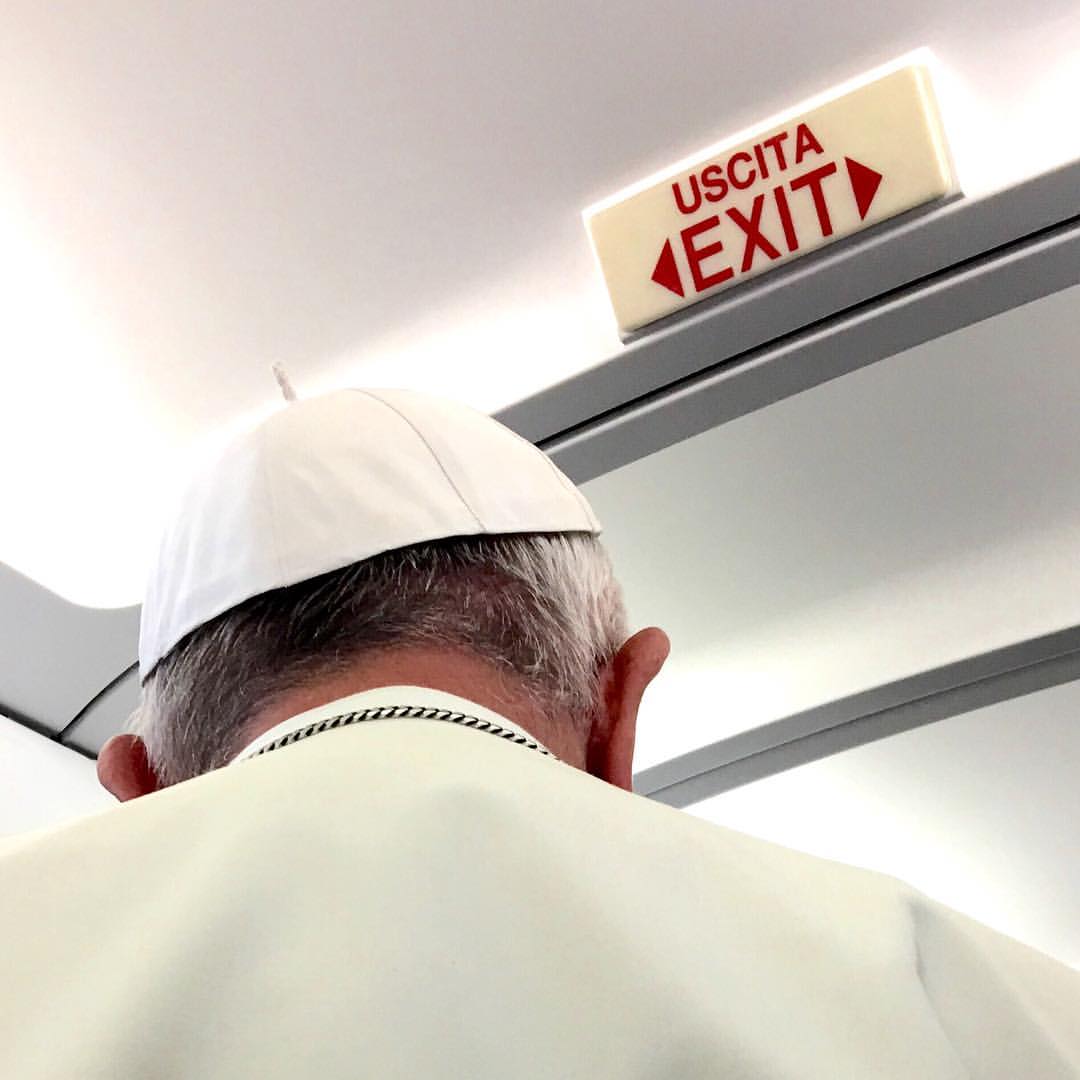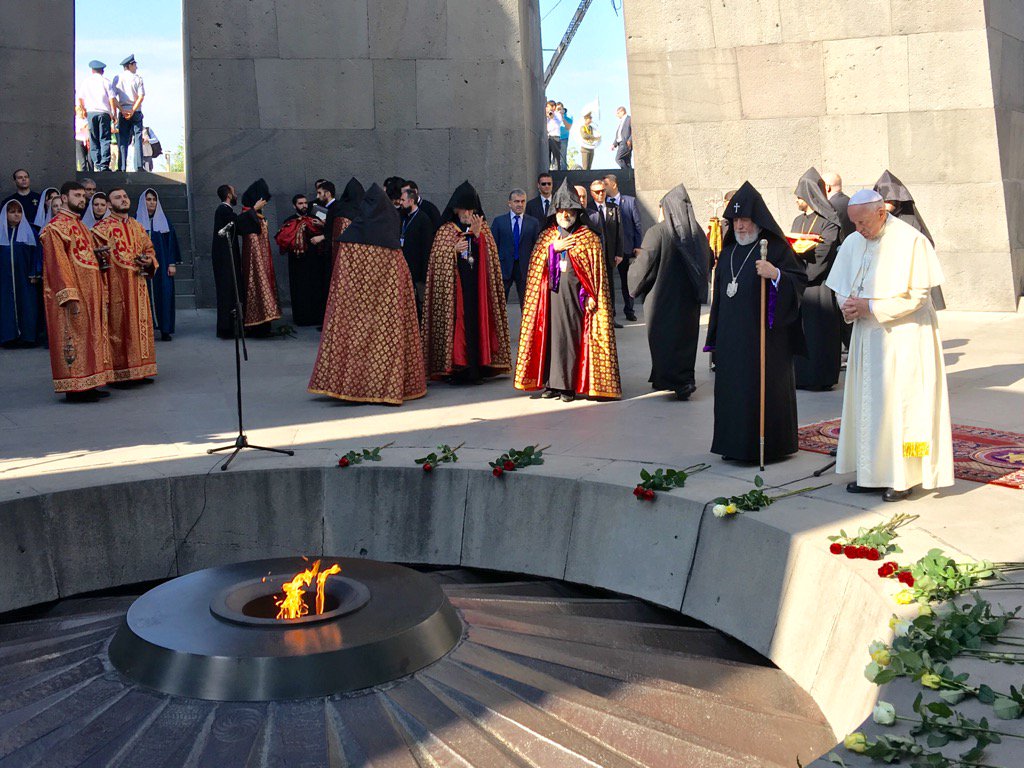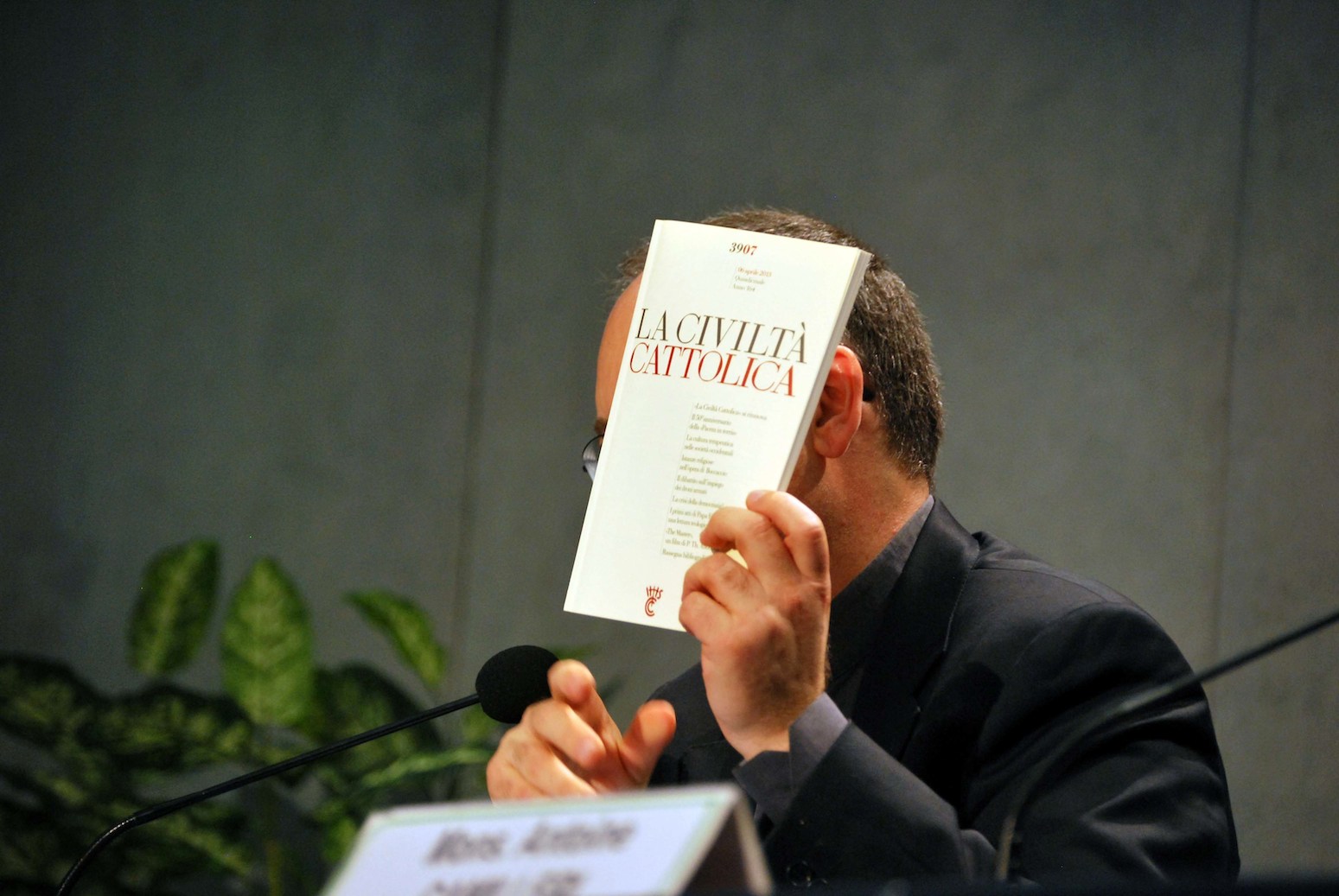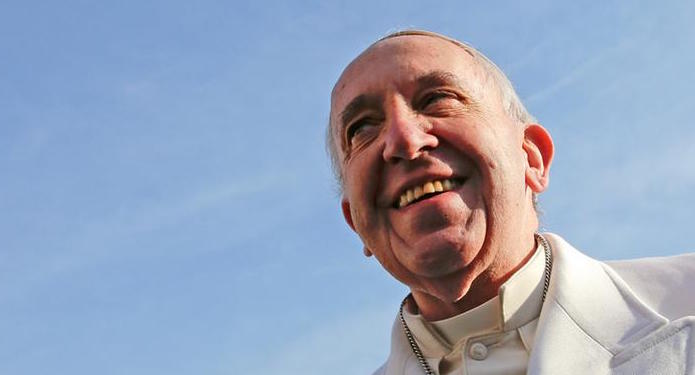 Lo que hay de común en los tres documentos más importantes del Papa Francisco — la exhortación apostólica Evangelii Gaudium, (La alegría del Evangelio), la encíclica Laudato Si, (sobre el cuidado de la casa común) y la exhortación Postsinodal Amoris Letitia, (sobre el amor en la familia) — es el tema de la alegría que aparece en distintas formas: gaudium, laudatio, letitia y esta alegría está vinculada a la idea de las condiciones de vida en común: la comunidad eclesial, el medio ambiente y la familia. Esta alegría se origina en la experiencia del encuentro con Jesucristo, “la alegría interna que llama y atrae a las cosas celestiales y a la propia salud de su alma, aquietándola y pacificándola en su Criador y Señor” (Ignacio de Loyola). La alegría del evangelio debe llegar a cristianos y no cristianos porque todo el mundo tiene el derecho de recibir el Evangelio, de allí que todos los cristianos estén permanentemente en una dinámica de salida hacia los demás. Otro núcleo fundamental de la enseñanza de Francisco es el discernimiento pues gracias a este se puede iluminar la realidad concreta de cada vida, este es un proceso que nos lleva a ser dóciles en el Espíritu, que nos invita a actuar con amor y misericordia en cada situación particular. Finalmente la preocupación del Papa es la de recontextualizar la doctrina al servicio de la misión pastoral de la Iglesia. La doctrina debe interpretarse en relación con el centro del Kerygma cristiano y a la luz del contexto pastoral en la que se aplica para la salus animarum.
Lo que hay de común en los tres documentos más importantes del Papa Francisco — la exhortación apostólica Evangelii Gaudium, (La alegría del Evangelio), la encíclica Laudato Si, (sobre el cuidado de la casa común) y la exhortación Postsinodal Amoris Letitia, (sobre el amor en la familia) — es el tema de la alegría que aparece en distintas formas: gaudium, laudatio, letitia y esta alegría está vinculada a la idea de las condiciones de vida en común: la comunidad eclesial, el medio ambiente y la familia. Esta alegría se origina en la experiencia del encuentro con Jesucristo, “la alegría interna que llama y atrae a las cosas celestiales y a la propia salud de su alma, aquietándola y pacificándola en su Criador y Señor” (Ignacio de Loyola). La alegría del evangelio debe llegar a cristianos y no cristianos porque todo el mundo tiene el derecho de recibir el Evangelio, de allí que todos los cristianos estén permanentemente en una dinámica de salida hacia los demás. Otro núcleo fundamental de la enseñanza de Francisco es el discernimiento pues gracias a este se puede iluminar la realidad concreta de cada vida, este es un proceso que nos lleva a ser dóciles en el Espíritu, que nos invita a actuar con amor y misericordia en cada situación particular. Finalmente la preocupación del Papa es la de recontextualizar la doctrina al servicio de la misión pastoral de la Iglesia. La doctrina debe interpretarse en relación con el centro del Kerygma cristiano y a la luz del contexto pastoral en la que se aplica para la salus animarum.
J. M. Bergoglio sulla poesia: ha dimora di carne e peso di ali non ancora spiegate in volo
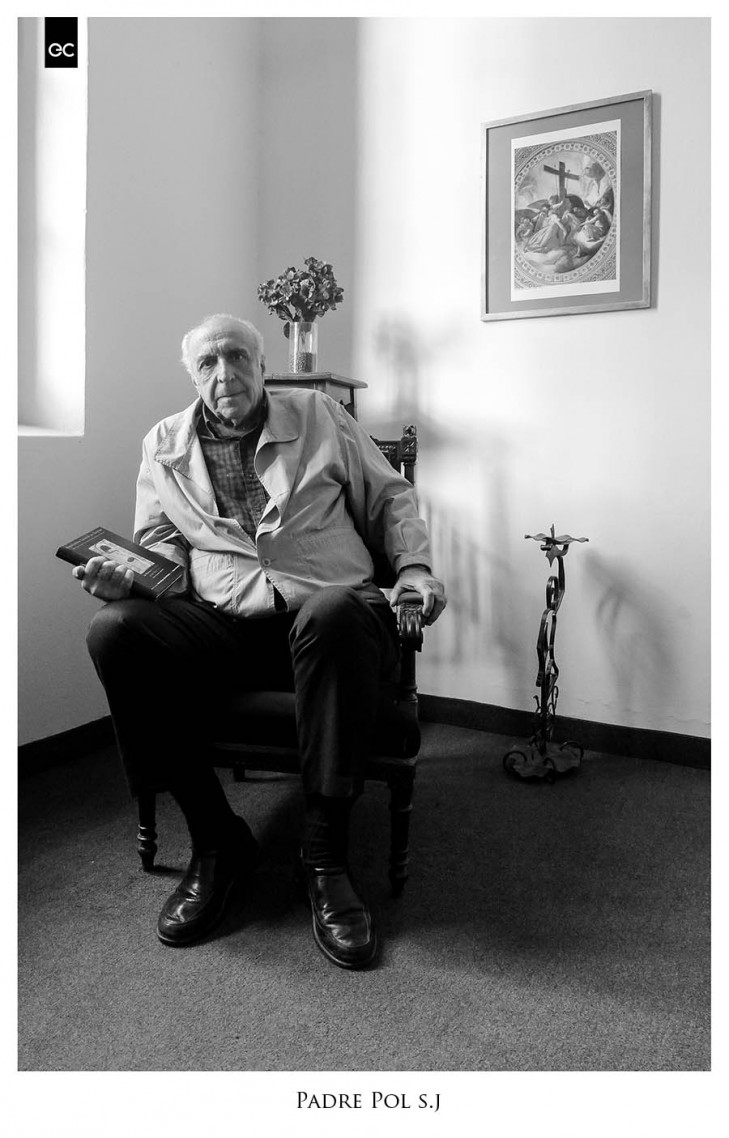 Il 19 settembre 2016 è morto p. Osvaldo Pol, gesuita argentino e poeta.
Il 19 settembre 2016 è morto p. Osvaldo Pol, gesuita argentino e poeta.
L’allora rettore del Colegio Máximo San José era p. Jorge Mario Bergoglio. Fu lui a scrivere una prefazione breve a una raccolta di sue poesie dal titolo De destierros y moradas.
In questo breve intervento il futuro Papa Francesco, ispirato dalla poesia del confratello, dà una definizione della parola poetica che colpisce per densità.
— Qui è riprodotto il testo di p. Bergoglio tradotto in italiano, a seguire l’originale e quindi alcune poesie di Osvaldo Pol.
PREFAZIONE DI P. JORGE MARIO BERGOGLIO
Padre Osvaldo Pol, gesuita, ex alunno e oggi professore, ha scritto quasi tutti questi sonetti qui, a casa sua. Alcuni sono già stati pubblicati, altri appaiono per la prima volta.
Le facoltà di Filosofia e Teologia sono liete di presentare questo libro di sonetti dove, in linguaggio poetico, si esprime la sapienza teologica, che è il frutto più apprezzato dalla Compagnia di Gesù nel suo impegno accademico.
Può sembrare paradossale che un poeta parli, con linguaggio della terra, di esiliati dalla terra. Può sembrare paradossale ma non lo è, perché la parola poetica ha dimore di carne nel cuore dell’uomo e – al tempo stesso – sente il peso di ali che ancora non hanno spiccato il volo. Arduo dilemma, questo, che santa Teresa esprime poeticamente e misticamente: “Com’è duro quest’esilio!”.
San Miguel, 20 giugno 1981, nel cinquantenario del Colegio Máximo San José
Jorge Mario Bergoglio, S.I.
Rettore
PROLOGO DEL P. JORGE MARIO BERGOGLIO
El Padre Osvaldo Pol, jesuita, ex-alumno y actual profesor, escribió casi todos estos sonetos en esta, su casa. Algunos fueron ya publicados, otros aparecen por primera vez.
Las Facultades de Filosofía y Teología se alegran en presentar este libro de sonetos donde, en lenguaje poético, se expresa la sabiduría teológica, que es el fruto más valorado por la Compañía de Jesús en su esfuerzo académico.
Parece paradójico que un poeta hable, con lenguaje de la tierra, de destierros. Parece paradójico pero no lo es, porque la palabra poética tiene moradas de carne en el corazón del hombre y -a la vez- siente la pesantez de una alas que todavía no han remontado su vuelo. Trabajoso dilema éste que expresa mística y poéticamente Santa Teresa: «qué duros estos destierros!»
San Miguel, 20 de junio de 1981, en el cincuentenario del Colegio Máximo de San José
Jorge Mario Bergoglio, S. J.
Rector
PREFACE OF FR. JORGE MARIO BERGOGLIO
Father Osvaldo Pol, Jesuit, former student and today professor, has written almost all these sonnets here, at his home. Some are already published, others appear for the first time.
The faculty of Philosophy and Theology are pleased to present this book of sonnets where, in poetic language, theological wisdom is expressed, which is the fruit most appreciated by the Society of Jesus in his academic commitment.
It can seem paradoxical that a poet speaks, with the language of the land, of the exiles of the land. It can seem paradoxical but it is not, because the poetic word has dwellings of flesh in the heart of man and—at the same time—it feels the weight of wings that have not yet taken flight. Arduous dilemma, this, that St Therese expressed poetically and mystically: «How hard is this exile!»
San Miguel, June 20, 1981, the fiftieth anniversary of the Colegio Máximo San José
Jorge Mario Bergoglio, S. J.
POESIE DI OSVALDO POL
Sólo una muerte. Sólo una vida
Sólo una muerte para tanta vida.
Sólo una noche sosegada y larga
para abarcar los días con su carga
de ansiedad y memoria sostenida.
Nos bastará una sola muerte erguida
sobre la luz que envuelve y aletarga.
Sólo una muerte aséptica y amarga
para esta fiebre que cabalga henchida,
para esta libertad irrefrenable,
para esta guerra a que la sangre llama,
para este ardido viaje de la suerte,
para este grito tenso, inabarcable,
para este hambre que devora y clama…
Sólo una vida para tanta muerte.
La vida, la vida es
¿Por dónde puede la mañana asirse
y describir su vuelo la esperanza?
¿Por qué caminos la inquietud alcanza
la patria de la paz donde abatirse?
Sueñan los sueños cómo al viento unirse
y arribar a una lenta playa mansa.
La fiebre se hace fuego y no descansa
empujando la sangre hasta esparcirse.
Y la vida, la vida es este abrirse
hacia lo otro dolorosamente.
Es golpear en las puertas hasta herirse.
Es saber que la muerte torpemente
querrá cercarnos. Y a la vez sentirse
vivos por siempre, empecinadamente.
La experiencia
La experiencia
Consiste
en intentar que el pájaro regrese
desde el extremo opuesto de la noche
y pose su cansancio
sobre tu abierto pecho adolescente.
Lo tomas en tus manos,
lo acaricias,
extraes de sus alas todo el viento
y mientras él se entrega a lo innombrable
tú te dejas volar.
Es fácil la experiencia.
Lo difícil
es dar con el momento
que te permita asesinar al pájaro
sin morir a su lado de tristeza.
Saber perder… es la sabiduría?
Decir adiós un día y otro día…
Dar por perdido lo que fué logrado.
Sentir que el verbo amar nos ha mostrado,
el corazón de la melancolía…
Ya no será lo mismo la alegría,
para siempre, sabremos que a su lado,
hay una sombra, un tiempo demarcado…
una puerta cerrada a la porfía.
Y no debe importar,
a lo acabado, le quedan mil comienzos todavía…
Aunque oscuro y desolado ande el sol…
Decir adios, negarse a la osadía
de pretender lo que nos fue negado…
Saber perder es la sabiduría.
Dios calla
Pudo sernos dolor y fue alegría.
Final… y fue comienzo y alborada.
Porque a veces se da… y frente a la nada
La plenitud nos crece como un día
Que no va hacia la noche y su acabada
Sombra tenaz, amenazante y fría,
Sino día que esgrime la osadía
De ser luz, sólo luz empecinada.
Pudo sernos aquello que temía
El corazón cuando agotado estalla
En la desesperanza y la agonía
Que lo aleja de Dios… Pero Dios calla
Para decirnos más. Y se extasía
Feliz el corazón tras su muralla.
Oración
Sentir que el vuelo encuentra su sentido
dejando lejos la inquietud que ha abierto
tanto indagar la noche en el incierto
ir y venir del corazón dolido.
Dejar que el alma se remanse. Henchido
abrir el pecho hacia el seguro puerto.
Y sembrarme a la sombra de ese huerto
que para mí tan solo ha florecido.
Tocar a Dios. Sentirme de Él tocado.
Y comprender entonces boquiabierto
el por qué y para qué de mi latido.
Y descubrir que el vuelo se ha trocado
en un vuelo más alto. Y que el desierto
era el solo refugio apetecido.
——
Los años van simplificando el caos.
Antes las cosas divagaban
de uno al otro extremo de mi cuarto.
Ni mías ni de sí mismas.
Ahora están afincándose seguras
aquí y allá
con recatados títulos y razones discretas,
apropiándose puestos y lugares,
imponiéndome su orden
y su método.
¿Será parte de la vida esta manera nueva
en que las cosas
van dictándome pautas de respeto,
sacralidades que antes no percibía,
grietas de donde viene la luz
y me reclaman?
¿O no será que llega
la hora de las despedidas?
Los libros, los retratos y las lámparas
que creí dominar
hoy me poseen.
La maravilla es que estoy a gusto.
***
Un ringraziamento a Emmanuel Sicre SJ che mi ha fatto conoscere la poesia di p. Pol
Un ringraziamento a Giuseppe Romano per la traduzione in italiano
Un ringraziamento a Reyanna Rice per la traduzione in inglese
Basic criteria for the implementation of chapter VIII of Amoris Laetitia
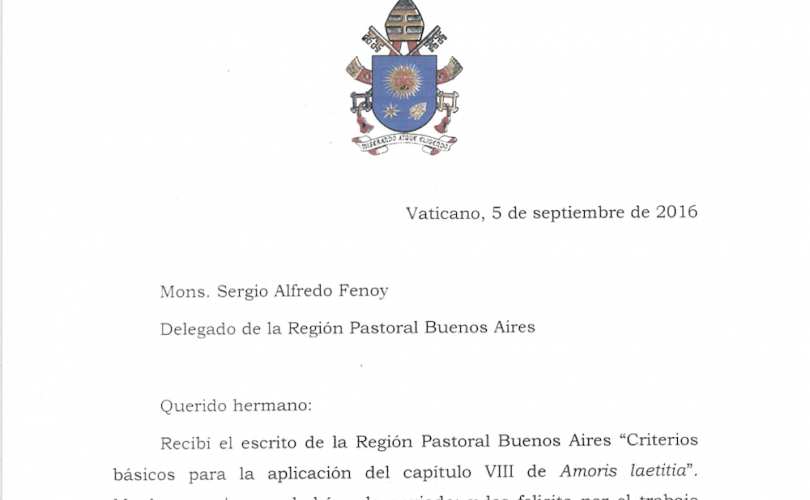 The Buenos Aires Pastoral Region (Argentina), where Cardinal Bergoglio used to work, encompasses the city of Buenos Aires and nearby cities, with a population of more than 13 million inhabitants. The Region is made up by more than 20 Bishops. Recently, they have sent their priests a document explaining their criteria on the potential access to sacraments of “the divorced who have entered a new union”. What makes this message particularly interesting is that it was sent to Pope Francis, who answered it with a letter stating that “the document is very good and thoroughly specifies the meaning of chapter VIII of Amoris laetitia. There are no further interpretations”. Therefore, the Bishops’ letter makes it possible to unambiguously recognize the correct interpretation of the papal document regarding the true scope of chapter VIII. The Pope also asked the Bishops to help disseminate the entire document, which is an invitation to consolidate marriages.
The Buenos Aires Pastoral Region (Argentina), where Cardinal Bergoglio used to work, encompasses the city of Buenos Aires and nearby cities, with a population of more than 13 million inhabitants. The Region is made up by more than 20 Bishops. Recently, they have sent their priests a document explaining their criteria on the potential access to sacraments of “the divorced who have entered a new union”. What makes this message particularly interesting is that it was sent to Pope Francis, who answered it with a letter stating that “the document is very good and thoroughly specifies the meaning of chapter VIII of Amoris laetitia. There are no further interpretations”. Therefore, the Bishops’ letter makes it possible to unambiguously recognize the correct interpretation of the papal document regarding the true scope of chapter VIII. The Pope also asked the Bishops to help disseminate the entire document, which is an invitation to consolidate marriages.
Buenos Aires Pastoral Region — Basic criteria for the implementation of chapter VIII of Amoris laetitia
Dear priests,
we have received with joy the exhortation Amoris laetitia, which invites us, above all, to encourage the growth of love between spouses and to motivate the youth to opt for marriage and a family. These are important issues that should never be disregarded or overshadowed by other matters. Francis has opened several doors in pastoral care for families and we are invited to leverage this time of mercy with a view to endorsing, as a pilgrim Church, the richness offered by the different chapters of this Apostolic Exhortation.
We will now focus on chapter VIII, since it refers to the “guidelines of the bishop” (300) in order to discern on the potential access to sacraments of the “divorced who have entered a new union”. We deem it convenient, as Bishops of the same Pastoral Region, to agree on some basic criteria. We present them without prejudice to the authority that each Bishop has over his own Diocese to clarify, complete or restrict them.
1) Firstly, we should remember that it is not advisable to speak of “permissions” to have access to sacraments, but of a discernment process in the company of a pastor. It is a “personal and pastoral discernment” (300).
2) In this path, the pastor should emphasize the fundamental proclamation, the kerygma, so as to foster or renew a personal encounter with the living Christ (cf. 58).
3) Pastoral accompaniment is an exercise of the “via caritatis”. It is an invitation to follow “the way of Jesus, the way of mercy and reinstatement” (296). This itinerary requires the pastoral charity of the priest who receives the penitent, listens to him/her attentively and shows him/her the maternal face of the Church, while also accepting his/her righteous intention and good purpose to devote his/her whole life to the light of the Gospel and to practise charity (cf. 306).
4) This path does not necessarily finish in the sacraments; it may also lead to other ways of achieving further integration into the life of the Church: greater presence in the community, participation in prayer or reflection groups, engagement in ecclesial services, etc. (cf. 299)
5) Whenever feasible depending on the specific circumstances of a couple, especially when both partners are Christians walking the path of faith, a proposal may be made to resolve to live in continence. Amoris laetitia does not ignore the difficulties arising from this option (cf. footnote 329) and offers the possibility of having access to the sacrament of Reconciliation if the partners fail in this purpose (cf. footnote 364, recalling the teaching that Saint John Paul II sent to Cardinal W. Baum, dated 22 March, 1996).
6) In more complex cases, and when a declaration of nullity has not been obtained, the above mentioned option may not, in fact, be feasible. Nonetheless, a path of discernment is still possible. If it is acknowledged that, in a concrete case, there are limitations that mitigate responsibility and culpability (cf. 301-302), especially when a person believes he/she would incur a subsequent fault by harming the children of the new union, Amoris laetitia offers the possibility of having access to the sacraments of Reconciliation and Eucharist (cf. footnotes 336 and 351). These sacraments, in turn, prepare the person to continue maturing and growing with the power of grace.
7) However, it should not be understood that this possibility implies unlimited access to sacraments, or that all situations warrant such unlimited access. The proposal is to properly discern each case. For example, special care should be taken of “a new union arising from a recent divorce” or “the case of someone who has consistently failed in his obligations to the family” (298). Also, when there is a sort of apology or ostentation of the person’s situation “as if it were part of the Christian ideal” (297). In these difficult cases, we should be patient companions, and seek a path of reinstatement (cf. 297, 299).
8) It is always important to guide people to stand before God with their conscience. A useful tool to do this is the “examination of conscience” proposed by Amoris laetitia 300, specifically in relation to “how did they act towards their children” or the abandoned partner. Where there have been unresolved injustices, providing access to sacraments is particularly outrageous.
9) It may be convenient for an eventual access to sacraments to take place in a discreet manner, especially if troublesome situations can be anticipated. At the same time, however, the community should be accompanied so that it may grow in its spirit of understanding and acceptance, without letting this situation create confusion about the teaching of the Church on the indissoluble marriage. The community is an instrument of mercy, which is “unmerited, unconditional and gratuitous” (297).
10) Discernment is not closed, because it “is dynamic; it must remain ever open to new stages of growth and to new decisions which can enable the ideal to be more fully realized” (303), according to the “law of gradualness” (295) and with confidence in the help of grace.
Above all, we are pastors. This is why we would like to welcome the following words of the Pope: “I also encourage the Church’s pastors to listen [to the faithful] with sensitivity and serenity, with a sincere desire to understand their plight and their point of view, in order to help them live better lives and to recognize their proper place in the Church” (312).
With love in Christ,
The Bishops of the Region
5 September, 2016
——
Vatican City, 5 September, 2016
To the Bishops of the Buenos Aires Pastoral Region, Mons. Sergio Alfredo Fenoy, Delegate of the Region
Dear brother,
I received the document of the Buenos Aires Pastoral Region entitled “Basic criteria for the implementation of chapter VIII of Amoris laetitia”. Thank you very much for sending it, and let me congratulate you on the work that you have undertaken: a true example of accompaniment of priests…and we all know how necessary it is for a bishop to stay close to his priests and for priests to stay close to their bishop. The bishop’s “neighboring” neighbor is the priest, and the commandment to love your neighbor as yourself begins, for us bishops, precisely with our priests.
The document is very good and thoroughly specifies the meaning of chapter VIII of Amoris laetitia. There are no further interpretations. And I am confident that it will do much good.
May the Lord reward this effort of pastoral charity. And it is precisely pastoral charity that drives us to go out to meet the strayed, and, once they are found, to initiate a path of acceptance, discernment and reinstatement in the ecclesial community. We know this is tiring, it is “hand-to-hand” pastoral care which cannot be fully addressed with programmatic, organizational or legal measures, even if these are also necessary. It simply entails accepting, accompanying, discerning, reinstating.
Out of these four pastoral attitudes the least refined and practised is discernment; and I deem it urgent to include training in personal and community discernment in our Seminaries and Presbyteries. Finally, I would like to recall that Amoris laetitia resulted from the work and prayers of the whole Church, with the mediation of two Synods and the Pope. For this reason, I recommend a full catechesis of the Exhortation, which will, most certainly, contribute towards the growth, consolidation and holiness of the family. Once again, thank you for your work and let me encourage you to carry on studying and teaching Amoris laetitia in the different communities of the dioceses. Please, do not forget to pray and to remind others to pray for me.
May Jesus bless you and may the Holy Virgin take care of you.
Fraternally,
FRANCIS
La riforma e le riforme nella Chiesa: gli atti del Seminario di Civiltà Cattolica
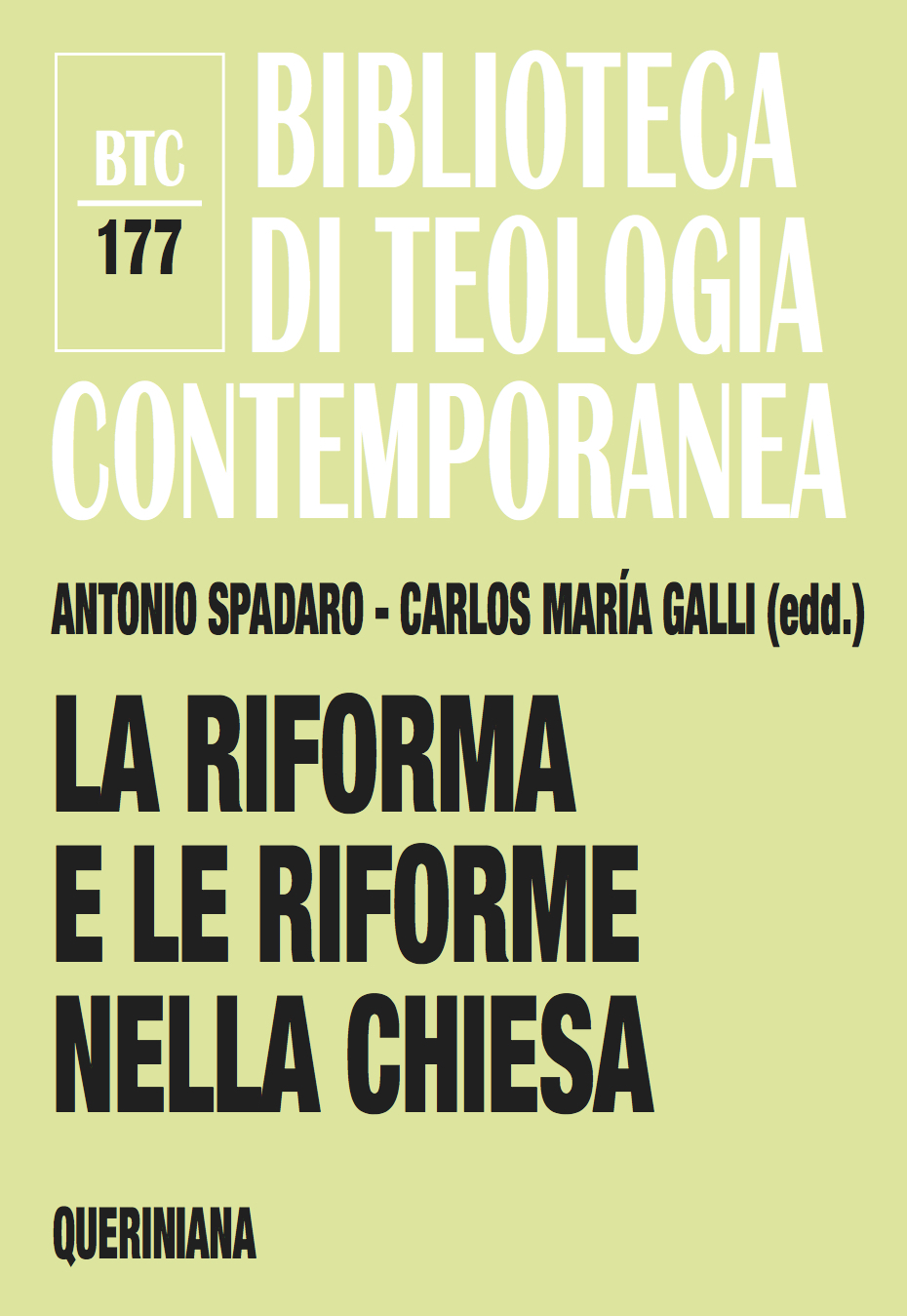 30 specialisti – ecclesiologi, storici, ecumenisti, canonisti ed esperti di pastorale – ai massimi livelli, provenienti da tredici diversi paesi, riprendono la questione della necessità di riforme nella Chiesa (Ecclesia semper reformanda), considerando in particolare il rinnovamento richiesto dal concilio Vaticano II. Sviscerano e sviluppano il tema, avendo lo scopo di offrire, con umiltà e audacia, un contributo di ispirazione ai processi che la Chiesa sta vivendo in questo tempo sotto la guida di Francesco.
30 specialisti – ecclesiologi, storici, ecumenisti, canonisti ed esperti di pastorale – ai massimi livelli, provenienti da tredici diversi paesi, riprendono la questione della necessità di riforme nella Chiesa (Ecclesia semper reformanda), considerando in particolare il rinnovamento richiesto dal concilio Vaticano II. Sviscerano e sviluppano il tema, avendo lo scopo di offrire, con umiltà e audacia, un contributo di ispirazione ai processi che la Chiesa sta vivendo in questo tempo sotto la guida di Francesco.
Descrizione
A cinquant’anni dalla chiusura del Vaticano II, la ricezione del concilio può dirsi semplicemente conclusa? Fra quanto già allora fu prospettato e l’implementazione che ne è seguita, non vi sono temi o istanze da riesaminare? Non è questione soltanto di rinnovare con lucidità e coraggio strutture e istituzioni, ma anche di convertirsi sempre di nuovo a una mentalità evangelica, missionaria, aperta, «in uscita».
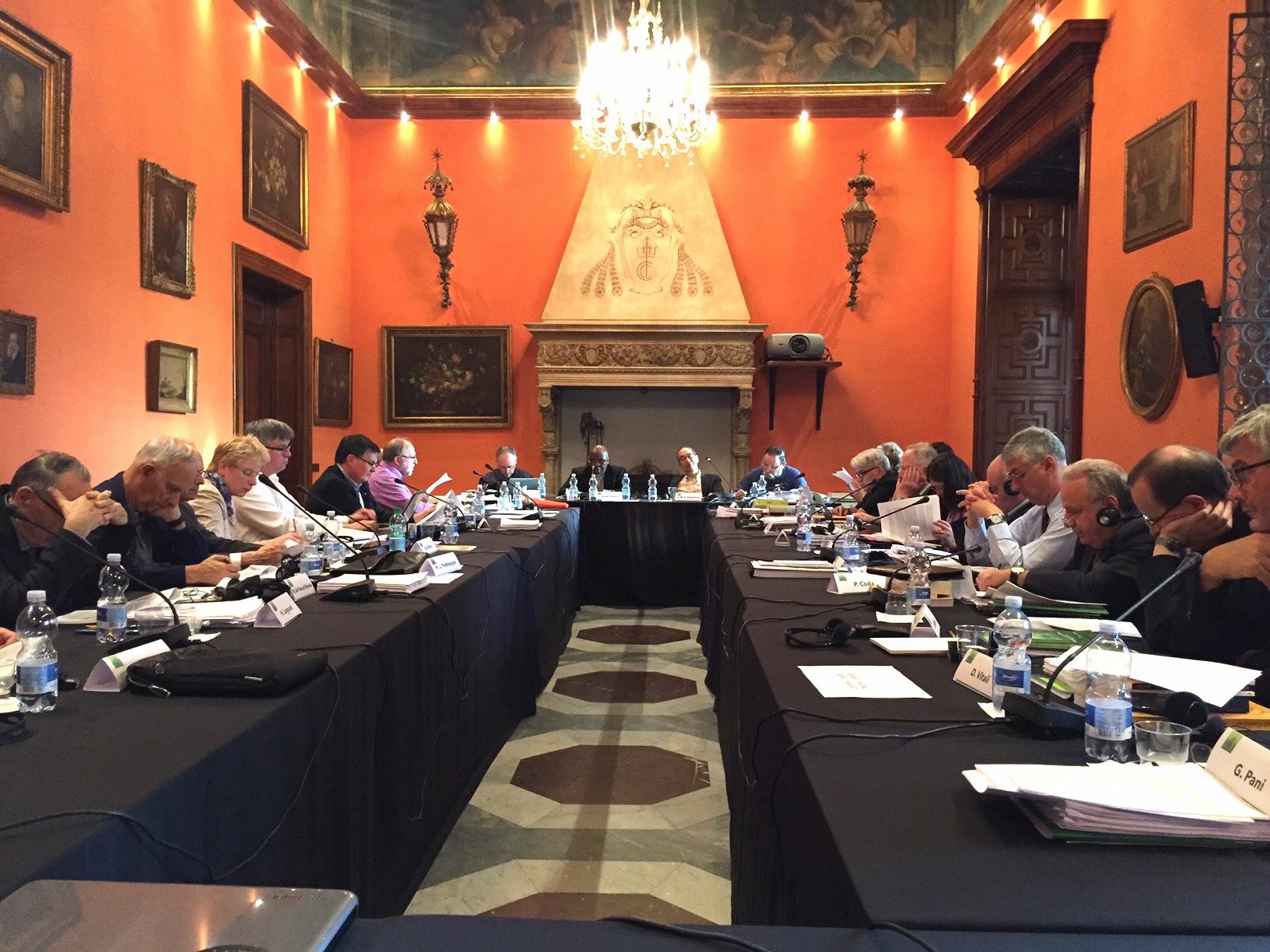 Nei diversi contributi offerti in questo libro da un gruppo internazionale di teologi, sotto l’egida de La Civiltà Cattolica col suo direttore,il gesuita p. Antonio Spadaro, e con la guida dell’argentino Carlos María Galli, vengono affrontati argomenti ricchi e complessi. Dopo una sezione sulla visione che papa Francesco ha della riforma della Chiesa e una riflessione sulle fonti permanenti del rinnovamento ecclesiale, si susseguono interventi puntuali sulle lezioni che vengono dalla storia, sulla comunione sinodale come chiave – a tutti i livelli – della vita e del rinnovamento del popolo di Dio, sulla questione dell’unità dei cristiani, per concludere con uno sguardo articolato verso una realtà di Chiesa più povera, più fraterna e più inculturata.
Nei diversi contributi offerti in questo libro da un gruppo internazionale di teologi, sotto l’egida de La Civiltà Cattolica col suo direttore,il gesuita p. Antonio Spadaro, e con la guida dell’argentino Carlos María Galli, vengono affrontati argomenti ricchi e complessi. Dopo una sezione sulla visione che papa Francesco ha della riforma della Chiesa e una riflessione sulle fonti permanenti del rinnovamento ecclesiale, si susseguono interventi puntuali sulle lezioni che vengono dalla storia, sulla comunione sinodale come chiave – a tutti i livelli – della vita e del rinnovamento del popolo di Dio, sulla questione dell’unità dei cristiani, per concludere con uno sguardo articolato verso una realtà di Chiesa più povera, più fraterna e più inculturata.
Gli autori – ecclesiologi, storici, ecumenisti, canonisti, pastoralisti –, lungi dal limitarsi a una discussione accademica, intellettualmente accattivante ma poco praticabile, esprimono volta per volta indicazioni su come approfondire e articolare le riforme della Chiesa, nei loro aspetti vitali e strutturali, suggerendo criteri di azione e ipotesi concrete per la prassi (a breve, medio e lungo termine).
Un libro di grande rilievo sotto il profilo teologico, gravido di conseguenze pastorali e istituzionali. Un umile ma audace contributo di ispirazione ai processi che la Chiesa sta vivendo sotto la guida di papa Francesco.
Questi i nomi del gruppo internazionale di autori e autrici che hanno contribuito al volume: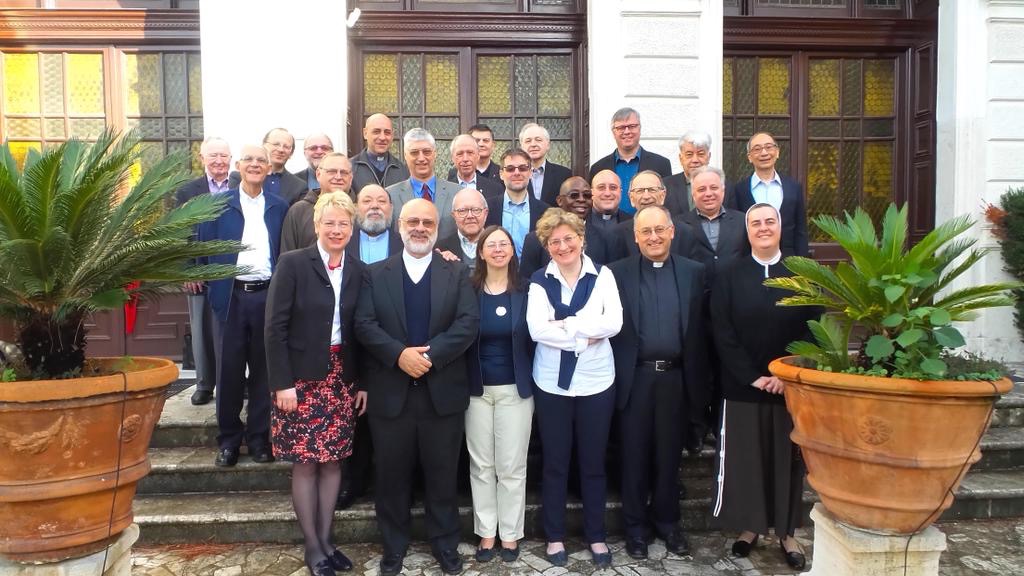
Alphonse Borras (Belgio); Piero Coda (Italia); Mario de França Miranda, sj (Brasile); Peter de Mey (Belgio); Severino Dianich (Italia) Massimo Faggioli (Stati Uniti); Joseph Famerée, sci (Belgio) Diego Javier Fares, sj (Argentina); Víctor Manuel Fernández (Argentina) José Mario C. Francisco, sj (Filippine); Carlos María Galli (Argentina) William Henn, ofm cap (Stati Uniti); Hervé Legrand, op (Francia) Angelo Maffeis (Italia); Mary Melone, sfa (Italia); Serena Noceti (Italia) John W. O’Malley, sj (Stati Uniti); Giancarlo Pani, sj (Italia); Salvador Pié-Ninot (Spagna); Hermann J. Pottmeyer (Germania); Andrea Riccardi (Italia); Gilles Routhier (Canada); Léonard Santedi Kinkupu (Rep. Dem. del Congo); Jorge A. Scampini, op (Argentina); Juan Carlos Sca nnone, sj (Argentina); Silvia Scatena (Italia); Carlos Schickendantz (Cile); Antonio Spadaro, sj (Italia); Dario Vitali (Italia); Myriam Wijlens (Olanda)
“TODAY THE CHURCH NEEDS TO GROW IN DISCERNMENT”. A private encounter of Pope Francis with some Polish Jesuits
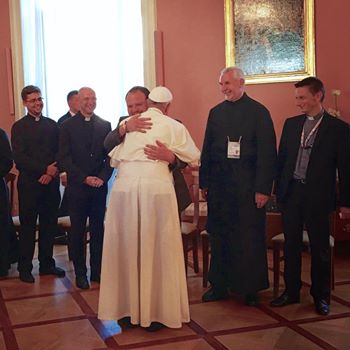 During his Apostolic Trip in Poland on the occasion of the 31st World Youth Day, July 30, 2016—first vespers of St Ignatius of Loyola—at 5 p,m., Pope Francis met with a group of 28 Polish Jesuits belonging to two Provinces of the Society of Jesus of the country and two lay collaborators, accompanied by the two Father Provincials, Fr Tomasz Ortman and Fr. Jakub Kolacz. Attended also the meeting other three Jesuits: fr. Andrzej Majewski, Vatican Radio’s director of programs, fr. Federico Lombardi, at that time director of the Press Office of the Holy See, and fr. Antonio Spadaro, editor in chief of La Civiltà Cattolica. The encounter occurred at the Archbishopric of Krakow in a climate of great simplicity, spontaneity and cordiality, and though it was not devoid of meaningful content to the Order, it also held meaning for the Church more in general. Francis greeted everyone present, one by one, and he focused in particular on those he had known in the past. When he was seated and began the dialogue, listening to the questions posed and answering in Italian, Fr. Kolacz translated his words into Polish, even though the majority of those present understood Italian well. Then the Pontiff received some gifts. Before concluding the encounter, lasting a total of 40 minutes, the Pope wanted to add a recommendation easily understandable in connection with his recent Magisterium. With the Holy Father’s approval, we report here the dialogue, in its immediacy, just as it happened, even preserving some personal memories. It is intended as a witnessing that—as you will read—even gathers some impressions of the Pontiff’s experience with the young people of WYD and also provides meaningful pastoral lines.
During his Apostolic Trip in Poland on the occasion of the 31st World Youth Day, July 30, 2016—first vespers of St Ignatius of Loyola—at 5 p,m., Pope Francis met with a group of 28 Polish Jesuits belonging to two Provinces of the Society of Jesus of the country and two lay collaborators, accompanied by the two Father Provincials, Fr Tomasz Ortman and Fr. Jakub Kolacz. Attended also the meeting other three Jesuits: fr. Andrzej Majewski, Vatican Radio’s director of programs, fr. Federico Lombardi, at that time director of the Press Office of the Holy See, and fr. Antonio Spadaro, editor in chief of La Civiltà Cattolica. The encounter occurred at the Archbishopric of Krakow in a climate of great simplicity, spontaneity and cordiality, and though it was not devoid of meaningful content to the Order, it also held meaning for the Church more in general. Francis greeted everyone present, one by one, and he focused in particular on those he had known in the past. When he was seated and began the dialogue, listening to the questions posed and answering in Italian, Fr. Kolacz translated his words into Polish, even though the majority of those present understood Italian well. Then the Pontiff received some gifts. Before concluding the encounter, lasting a total of 40 minutes, the Pope wanted to add a recommendation easily understandable in connection with his recent Magisterium. With the Holy Father’s approval, we report here the dialogue, in its immediacy, just as it happened, even preserving some personal memories. It is intended as a witnessing that—as you will read—even gathers some impressions of the Pontiff’s experience with the young people of WYD and also provides meaningful pastoral lines.
Antonio Spadaro S.J.
Your message gets to the heart of the young people. How do you speak to them so effectively? Could you give us some advice for working with youth?
When I speak, I must look people in the eyes. It isn’t possible to look in the eyes of all of them, but I look into the eyes of this one, of this one, of this one….and everyone feels I look at them. It is something that comes to me spontaneously. This is how I do it with the young people. But, then the young people, when you speak with them, ask questions…..Today at lunch they asked some questions….They even asked me how I go to confession! They have no discretion. They ask direct questions. And you always need to answer a young person with the truth. A young man asked me: «How do you confess?». And I began to talk about myself. He said to me: «In my country there were scandals tied to priests and we do not have to courage to go to confession with these priests who have lived these scandals. I cannot do it.». You see: they tell you the truth, at times they reprimand you…Young people speak directly. They want the truth or at least a clear «I don’t know how to answer you». You never find subterfuges with young people. So with prayer. They asked me: «How do you pray?». If you answer with a theory they remain disappointed. Young people are generous. But the work with them also requires patience, a lot of patience. One of them asked me today: «What should I say to a friend who does not believe in God so that they can become a believer?». Here, you see that at times young people need «recipes». Then you must be ready to correct this attitude that requires recipes and ready answers. I answered: «See that the last thing that you must do is to say something. Begin to do something. Then he or she will ask you explanations on how you live and why». Here, you must be direct, direct with the truth.
What is the role of the Jesuit universities?
A university as a straight line from the Jesuits must point to a global formation, not only intellectual, a formation of the whole human person. In fact if the university becomes simply an academy of ideas or a «factory» of professionals or a mentality centered on business prevails in its structure then it is truly off the path. We have the Exercises in hand. Here’s the challenge: take the university on the path of the Exercises. This means risking on the truth, and not on the «closed truth» that no one discusses. The truth of the encounter with people is open and requires that we let ourselves make enquiries truly from reality. And the Jesuit university must be involved with the real life of the Church and the Nation: also this is reality, in fact. A particular attention must be always be given to the marginalized, to the defense of those have more need of being protected. And this—it is clear—is not being a Communist: it is simply being truly involved with reality. In this case, in particular a Jesuit university must be fully involved with reality expressing the social thought of the Church. The free-market thought that removes man and woman from the center and puts money at the center is not ours. The doctrine of the Church is clear and it must move forward in this sense.
Why did you become a Jesuit?
When I entered the seminary, I already had a religious vocation. But at that time my confessor was anti-Jesuit. I also liked the Dominicans and their intellectual life. Then I got sick and had to undergo lung surgery. Later another priest helped me spiritually. I remember when I then told the first priest that I had entered the Jesuits, he truly did not take it well. But here the irony of the Lord moved. In fact, at that time they were receiving minor orders. The tonsure is done in the first year of theology. The rector told me to go to Buenos Aires to the auxiliary bishop, Mons. Oscar Villena, to look for him to do the tonsure ceremony. I went to the House of Clergy, but they told me that Mons. Villena was sick. There was in his place another monsignor who was precisely that first priest who had then became a Bishop! And I received the tonsure precisely from him! And we have made peace after many years…. But, yes, I can say, my choice of the Society matured by itself…
There are some recently ordained priests in this group. Do you have advice for their future?
You know: the future is from God. The most that we can do is the feasible. And the feasible are all of the bad spirit! An advice: the priesthood is truly a great grace: your priesthood as a Jesuit is soaked in the spirituality that you have lived up to now: the spirituality of the Suscipe of St Ignatius.[1]
[At this time the encounter seems to be ending with the delivery to the Pontiff of gifts from some Jesuits who followed some young people connected to Ignatian spirituality who came from all over the world to WYD. Francis then wants to add a recommendation and everyone sits down again.]
I want to add something now. I ask you to work with seminarians. Above all, give them what you have received from the Exercises: the wisdom of discernment. The Church today needs to grow in the ability of spiritual discernment. Some priestly formation programs run the risk of educating in the light of overly clear and distinct ideas, and therefore to act within limits and criteria that are rigidly defined a priori, and that set aside concrete situations: «you must do this, you must not do this.». And then the seminarians, when they become priests, find themselves in difficulty in accompanying the life of so many young people and adults. Because many are asking: «can you do this or can you not?». That’s all. And many people leave the confessional disappointed. Not because the priest is bad, but because the priest doesn’t have the ability to discern situations, to accompany them in authentic discernment. They don’t have the needed formation. Today the Church needs to grow in discernment, in the ability to discern. And priests above all really need it for their ministry. This is why we need to teach it to seminarians and priests in formation: they are the ones usually entrusted with the confidences of the conscience of the faithful. Spiritual direction is not solely a priestly charism, but also lay, it is true. But, I repeat, you must teach this above all to priests, helping them in the light of the Exercises in the dynamic of pastoral discernment, which respects the law but knows how to go beyond. This is an important task for the Society. A thought of Fr. Hugo Rahner has often struck me[2]. He thought clearly and wrote clearly! Hugo said that the Jesuit must be a man with the nose for the supernatural, that is he must be a man gifted with a sense of the divine and of the diabolical relative to the events of human life and history. The Jesuit must therefore be capable of discerning both in the field of God and in the field of the devil. This is why in the Exercises St Ignatius asks to be introduced both to the intentions of the Lord of life and to those of the enemy of human nature and to his lies. What he has written is bold, it is truly bold, but discernment is precisely this! We need to form future priests not to general and abstract ideas, which are clear and distinct, but to this keen discernment of spirits so that they can help people in their concrete life. We need to truly understand this: in life not all is black on white or white on black. No! The shades of grey prevail in life. We must them teach to discern in this grey area.
[The encounter ends here above all by the necessity to continue on the day’s program brought to the attention of the Holy Father by his collaborators. Before taking his leave, however, Francis wanted once more to greet the Jesuits one by one concluding with a final blessing.]
[1] The Suscipe is a prayer that St Ignatius inserts in his Spiritual Exercises within the so-calledContemplatio ad amorem (n. 234): «Take Lord, and receive all my liberty, my memory, my understanding, and my entire will, all that I have and possess. You have given all to me. To You, O Lord, I return it. All is Yours, dispose of it wholly according to Your will. Give me Your love and Your grace, for this is enough for me». Recall that even Benedict XVI recommended the IgnatianSuscipe responding to a seminarian during a visit to Major Roman Seminary, February 17, 2007.
[2] Here the Pontiff refers to a test of Hugo Rahner that arose following a study session on Ignatian spirituality. The most recent Italian edition is the following: Come sono nati gli Esercizi. Il cammino spirituale di sant’Ignazio di Loyola, Rome, Adp, 2004. Francis here was referring to the reflections that Hugo Rahner wrote in chapter eight of the volume. We note that chapter three of the same study was cited by Blessed Paul VI December 3, 1974, speaking to the 32nd General Congregation of the Society of Jesus.
THIS IS A WORKING TRANSLATION by Reyanna Rice. The original text is published here: http://www.laciviltacattolica.it/it/quaderni/articolo/3867/oggi-la-chiesa-ha-bisogno-di-crescere-nel-discernimento-un-incontro-privato-con-alcuni-gesuiti-polacchi-/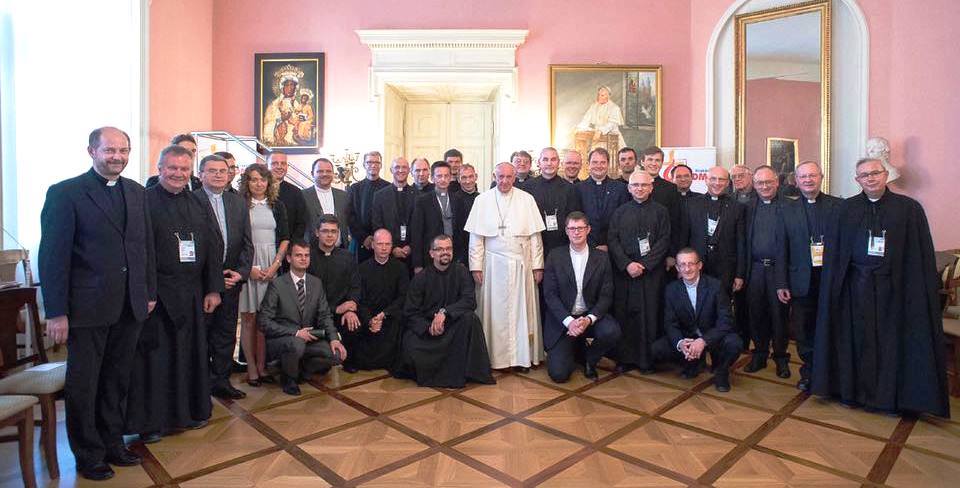
Il mio grazie personale a padre Federico Lombardi
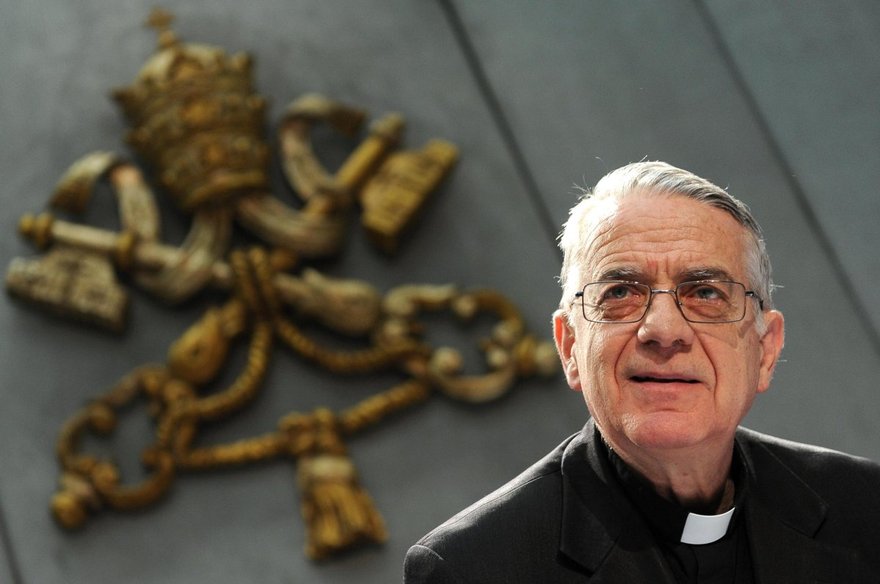 Oggi, 11 luglio 2016, Papa Francesco ha accolto la rinuncia, presentata da P. Federico Lombardi, dall’ufficio di Direttore della Sala Stampa della Santa Sede.
Oggi, 11 luglio 2016, Papa Francesco ha accolto la rinuncia, presentata da P. Federico Lombardi, dall’ufficio di Direttore della Sala Stampa della Santa Sede.
Padre Federico Lombardi è un grande comunicatore. Ovviamente potrei scrivere subito dell’aspetto professionale della sua figura, ma qui vorrei esprimermi innanzitutto per esperienza personale, umana e spirituale.
È ben noto per le sue doti evidenti e sperimentate al servizio della Santa Sede sin dal 1990, quando divenne direttore dei programmi della Radio Vaticana, fino ad oggi. Io lo ricordo anche per il suo prezioso servizio a La Civiltà Cattolica dal 1973 al 1984. Io, qui, in realtà lo ricordo innanzitutto come Superiore Provinciale dei Gesuiti d’Italia, carica che ha ricoperto dal 1984 fino al 1990.
Il p. Lombardi che io ho conosciuto è stato il padre Lombardi «Provinciale» dei gesuiti. Se adesso sono gesuita, infatti, è «per colpa» sua: lui mi ha ammesso nel noviziato della Compagnia, vagliando la mia vocazione. Tuttavia prima di giungere a questa decisione ha conosciuto e dialogato molto con mia madre, che all’inizio era molto contraria alla mia scelta in quanto sono figlio unico: non ho né fratelli né sorelle. In questa occasione ho compreso che p. Federico Lombardi non «fornisce informazioni» ma «condivide la sua esperienza». Infatti ha ascoltato mia mamma facendosi davvero carico del suo problema, assumendo le sue istanze in maniera equilibrata, ascoltandola, comunicando con lei a un livello profondo. Posso dirvi che, anche prima di accettare la mia vocazione, come poi ha fatto pienamente, da subito mia madre ha imparato a voler bene e ad apprezzare quello che sarebbe stato il mio Superiore religioso.
Successivamente, quando non era più Provinciale, ho sperimento la capacità comunicativa di p. Lombardi in altre occasioni, come, ad esempio, le nostre «Congregazioni Provinciali», una sorta di «capitolo» dell’Ordine. Quando c’era un problema si faceva ricorso a lui. E in genere i problemi erano (e sono tuttora) di comunicazione.
Conosco il suo impegno da noi a Civiltà Cattolica soltanto grazie all’eco che ancora in casa è vivo della sua azione come vicedirettore. Padre Lombardi lavorava, lavorava tanto. In quegli anni, tra l’altro, scalava il monte Amaro (2.800 metri, la cima più alta della Majella) in 3 ore, mi dicono. In metà tempo rispetto a molti altri: un’immagine della sua capacità di lavoro e di servizio.
Circa il suo ruolo come direttore della Sala Stampa posso aggiungere un piccolo aneddoto: alla fine del Conclave, dopo l’elezione del Papa, ho incontrato una giornalista statunitense considerata «pericolosa». Ero molto nervoso per questa intervista. Ma mi ha colpito la prima cosa che mi disse: «Sa una cosa, padre? Io amo il p. Lombardi». Alla mia domanda sul perché, su che cosa intendesse dire, lei proseguì: «sono rimasta colpita dal suo modo di gestire con precisione, ma anche leggerezza il suo ruolo».
Padre Lombardi esprime una tensione pastorale di accoglienza unita a una discrezione che non lo mette sotto la luce dei riflettori, eppure lo rende in qualche modo necessario: crea l’ambiente comunicativo corretto. Io lo ammiro anche perché ha saputo adattarsi a due stili completamente diversi di vivere il Pontificato: la discrezione e la delicatezza di Benedetto; la spontaneità comunicativa imprevedibile di Francesco.
Concludo con un altro piccolo tassello aneddotico. Mi ha colpito quando in un’occasione ufficiale di festeggiamento per l’Ottantesimo l’anniversario della Radio Vaticana, padre Lombardi disse con la sua proverbiale compostezza: «La Radio Vaticana non è una radio». No, non intendeva fare il verso a René Magritte che nel 1948 dipinse «Questa non è una pipa», ma far capire che il mondo della comunicazione era cambiato e che la convergenza dei media fa sì che non ci sia un «mezzo» di comunicazione, e poi un altro «mezzo», e poi un altro «mezzo»… tutti uno accanto all’altro come differenti pianeti di un sistema solare. Voleva far capire all’uditorio che la comunicazione è complessa e ogni piattaforma comunicativa non può far a meno delle altre. La Radio oggi è anche testi, video, social networks… Ovviamente questo lavoro è possibile anche grazie alle sinergie tra i diversi media della Santa Sede. E la sinergia non si inventa: è frutto di una sapiente mediazione, nella quale il p. Lombardi è maestro. E la sua maestria si è confermata nella gestione coraggiosa e sapiente della complessa macchina comunicativa del recente Sinodo straordinario sulla famiglia.
Aggiungo una parola sui viaggi con Papa Francesco: andare sul volo papale guidati e accompagnati da p. Federico è stata una esperienza straordinaria: lui è sempre stato consapevole delle possibili sorprese dietro l’angolo, ma è anche sempre stato capace di adeguarvisi con un aplomb magistrale. Non dimenticherò mai il confronto con lui su discorsi, eventi e sorprese… E soprattutto la fraternità e la condivisione, a volte anche del luogo dove fare una breve sosta.
A te, caro Federico, complimenti e, di cuore, grazie per il tuo servizio a tre Papi (molto diversi tra loro!), svolto sempre con intelligenza, fedeltà e passione umile e disponibile per il bene della Chiesa!
Antonio Spadaro S.I.
direttore de La Civiltà Cattolica
La mirada de BERGOGLIO es la de MAGELLANES
Pope Francis: the Idea of Europe and the end of the Charlemagne era
Pope Francis received the prestigious Charlemagne Prize May 6, 2016. In his discourse he cited the great Jesuit theologian Erich Przywara, teacher of Hans Urs von Balthasar and author of the essay Idee Europa [The Idea of Europe] [1] Citing L’idea di Europa, that he knows well, Francis reveals his conviction, which was that of the Jesuit theologian: we are at the end of the Constantinian epoch and the experiment of Charlemagne. It is interesting, therefore, that the Pope quotes Przywara precisely in this Carolinian context.
«Christendom», that is that process started with Constantine in which he implements an organic bond between culture, politics, institutions and the Church, is concluding. Przywara — together with the Austrian historian Friedrich Heer [2] — is convinced that Europe was born and raised in relationship and in contraposition with the Sacrum imperium, that has its own roots in the attempt by Charlemagne to organize the West as a totalitarian state.
This process is evaluated by Heer as «the possibility for the Church to resume the evangelical paths started by Francis of Assisi, Ignatius of Loyola and Teresa of Lisieux, breaking down the barriers that separated her from the poor to whom Christianity—in the theological political conjuncture of the various forms of Christianity—always appeared as an ideological policy —and the guarantee — of the dominant groups». [3] For Heer the end of Christendom does not mean the decline of the West, but rather brings in itself a decisive theological resource in as much as the mission of Charlemagne is at the end. Christ himself resumes the work of conversion. The wall falls that almost up to the present day has impeded the Gospel from reaching the deeper layers of the conscience, from penetrating to the center of the soul. [4]
He thus radically refuses the idea of the realization of the Kingdom of God on earth, that was at the base of the Holy Roman Empire and all similar political and institutional forms, up to the dimension of the political «party». If so understood, in fact, the «chosen people» would enter into an intricate interweaving of religious, institutional and political dimensions that cause them to lose awareness of its universal diakonia and would contraposition them to those who are alienated, to the those who do not belong, that is the «enemy».
The Pope has confirmed his vision citing Przywara a few days after having received the prize, May 9, in an interview with the French daily La Croix. Questioned on why he speaks of the «European identity», the pontiff answers: «We need to speak of roots in the plural because there are so many. In this sense, when I hear talk of the Christian roots of Europe, I sometimes dread the tone, which can seem triumphalist or even vengeful. It then takes on colonialist overtones. John Paul II, however, spoke about it in a tranquil manner. Yes, Europe has Christian roots and it is Christianity’s responsibility to water those roots. But this must be done in a spirit of service as in the washing of the feet. Christianity’s duty to Europe is one of service. As Erich Przywara, the great master of Romano Guardini and Hans Urs von Balthasar, teaches us, Christianity’s contribution to a culture is that of Christ in the washing of the feet. In other words, service and the gift of life. It must not become a colonial enterprise».[5]
With Przywara, Bergolio recognizes — precisely as is affirmed in the Letter to the Hebrews (13:13) — that Christians must «go outside of the camp to bring the outrage of Christ».[6] And the Church must be in exit and never be a closed and excluding entity. She is to follow Christ outside of the wall of the holy city, where he died as an accursed man to be able to gather together the whole of humanity, even those who believed him accursed and abandoned by God (cfr Gal 3:13).
Here arises the idea of the Church as «a field hospital», also evoked in the discourse of the President of the European Council, Tusk. And in fact Francis continues in his discourse affirming that «To the rebirth of a Europe weary, yet still rich in energies and possibilities, the Church can and must play her part». How? Proclaiming the gospel, that «more than ever finds expression in going forth to bind the wounds of humanity with the powerful yet simple presence of Jesus, and his mercy that consoles and encourages».
Here is, therefore, what the task of the Church should be, definitely post-Carolinian: to be in exit, going out and encountering the wounded. This is what Francis is doing, seeking thus to contribute to enlarging the soul of Europe.
[1] Cfr J. L. Narvaja, «La crisi di ogni politica cristiana. Erich Przywara e l’“idea di Europa”», in La Civiltà Cattolica 2016 I 437-448. Cfr also A. Spadaro, «La diplomazia di Francesco. La misericordia come processo politico», in La Civiltà Cattolica 2016 I 209-226, 218-220.
[2] E. Przywara, L’ idea d’Europa. La «crisi» di ogni politica «cristiana», Trapani, Il Pozzo di Giacobbe, 2013, 119. Cfr F. Heer, Aufgang Europas. Eine Studie zu den Zusammenhängen zwischen politischer Religiosität, Frömmigkeitsstil und dem Werden Europas im 12. Jahrhundert, Wien, Europa Verlag, 1949.
[3] F. Mandreoli – J. L. Narvaja, «Introduzione», in E. Przywara, L’ idea d’Europa. La «crisi» di ogni politica «cristiana», Trapani, Il Pozzo di Giacobbe, 2013, 55.
[4] Cfr ivi, 55; G. Zamagni, «“Tra Costantino e Hitler”. L’Europa di Friedrich Heer», in Id., Fine dell’era costantiniana. Retrospettiva genealogica di un concetto critico, Bologna, il Mulino, 2012, 55-57.
[5] G. Goubert – S. Maillard, «Le devoir du christianisme pour l’Europe, c’est le service», in La Croix, 17 maggio 2016.
[6] E. Przywara, L’ idea d’Europa…, cit., 122 s.
Il mio Tweetbook del Viaggio di Papa Francesco in Armenia – #PapaArmenia e #PopeInArmenia
Ecco il mio TweetBook del Viaggio di Papa Francesco in Armenia (24-26 giugno 2016). Ci sono circa 190 immagini di questo viaggio durato 3 giorni.
Seguendo il Papa nel suo viaggio ho preso appunti visivi: immagini scattate senza ricercatezza stilistica ma che cercano di comunicare l’istante, il gesto, il contesto. A volte sono immagini «sporche», persino sfocate e mosse, ma forse proprio così possono ricordare a me e comunicare ad altri l’intensità emotiva e l’impatto dell’evento. In genere sono taggate con l’hashtag #PapaArmenia e #PopeInArmenia.
Ho inviato i Tweet “in diretta”, uno dopo l’altro, e adesso li ho raccolti in questo book digitale in pdf che si può scaricare liberamente da QUI.

